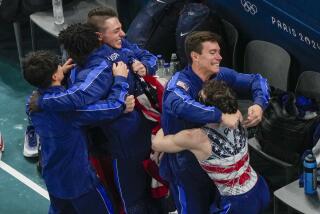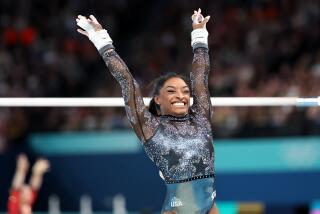It’s One Giant Leap Backward This Time
SACRAMENTO — Robert Howard was standing off to the side of the Hornet Stadium track Monday night, screaming at a television set, screaming for justice.
“Hello America! Did you see it? I’m watching it on television right now!” Howard yelled as he watched the replay of his sixth and final attempt in the men’s long jump final, the one he claimed was mis-marked by more than half a foot, costing him a berth on the U.S. Olympic team.
Howard turned to a nearby group of reporters, flailed his arms above his head and began railing again.
“If I don’t make the Olympic team, I have to go to medical school on Aug. 28,” he said, pacing back and forth, fuming. “If I make the team, they’ll defer me for two years. I guess they want me to go to medical school.”
Howard finished fourth in the final when his sixth jump was marked at 26 feet 3 3/4 inches. Howard claimed he actually jumped 26-10, which would have been good enough for second place and an automatic berth to Sydney, Australia.
According to meet officials, there had been some question over whether Howard’s shorts hit the sand. Howard argued that before the issue could be resolved, his footmarks had been already raked from the pit, all evidence erased.
“I’ve been in track and field for 20 years, and nobody is going to rush in and rake it up like that,” Howard said. “What’s the rush?”
Howard also raged, somewhat irrationally, against the long jump judge, Ken Gibson.
“The guy is 52 years old. How is he going to see it right?” Howard asked. “If they want to advance the sport, they’ve got to do something.”
Howard began pacing again and flailing again, cursing a fate he considered irreversible..
“Unless they go wake up Primo from the dead, I’m done,” he said, referring to the late president of international track and field, Primo Nebiolo. “Sayonara. Checked out. Peace. I’m out.
“I don’t have any rights. There are no amendments out here. Case closed.”
Someone then informed Howard that he had the right to protest.
“I already did!” he cried.
In writing, he was told. Within 30 minutes of the completion of his event.
“Give me a pen, then!” Howard replied. “And some paper! Where’s the fax machine?”
In the end, Howard never filed the protest, believing the court of trackside opinion was already sufficiently against him.
The judging controversy overshadowed a rather mediocre competition, won by Melvin Lister with a jump of 27-3 3/4-- the shortest winning jump at the U.S. trials since 1980, when Larry Myricks placed first with a mark of 27-2.
Dwight Phillips finished second with a jump of 26-8 1/2. Walter Davis was third at 26-7 1/4.
Erick Walder, a 1997 world silver medalist, and NCAA champion Savante Stringfellow both failed to qualify. Stringfellow placed fifth at 26-4 1/2, Walder fifth at 26-3 1/2.
Phillips was asked if he had seen Howard’s sixth jump and if the aggrieved athlete had a legitimate argument.
“Yeah, I saw it,” Phillips said. “I don’t know exactly what happened. It really doesn’t matter to me, I’m going to Sydney.”
And Lister, instead of savoring his gold medal, was asked to defend the current crop of American long jumpers, derided in the media as unworthy heirs to the legacy of Carl Lewis, Bob Beamon, Ralph Boston and Mike Powell.
“I don’t think it’s fair to say we aren’t going to live up to it,” Lister said. “I feel bad that we haven’t done so yet. But we will.
“I’m 22 years old. I just got started. You will see me in the future.”
To put the Americans’ sorry current state in perspective, Lister’s victorious jump was more than a foot shorter than the best 2000 mark of Cuba’s Ivan Pedroso, the world leader at 28-4 1/2.
“I can jump as well as Pedroso,” Lister professed, perhaps attempting to convince himself. “I’m a great long jumper just waiting to happen.”
Phillips opted for a similar tack.
“I plan on being one of the guys who brings U.S. long jumping back to the top,” Phillips said. “I know I can jump 28 feet. It’s just a matter of time.”
*
The UCLA alumni assn. placed 1-2 in the women’s discus final, with Seilala Sua winning with the second-longest women’s throw in U.S. history, followed by 1996 trials champion Suzy Powell.
Sua, who completed her four-year sweep of NCAA discus titles last month, put this competition away early with a throw of 216 feet 2 inches, only eight inches shy of Carol Cady’s American record of 216-10, set in 1986.
“I was planning on getting a good throw early,” Sua said. “I wasn’t thinking about getting the American record, just getting a good throw. I knew when it came out of my hand it had to be a good one. I said, ‘Stay in, stay in.’ ”
Powell held firm in second place throughout the final, opening with a throw of 199-7, improving on that distance three times before closing with a mark of 211-10.
Kristin Kuehl took third place with a best throw of 202-7.
“There’s never been an Olympic trials this competitive at a high level,” Powell said. “Never.”
*
Sandra Glover won her second national championship and qualified for her first Olympic team impressively, setting a U.S. trials record with her time 53.33 seconds in the women’s 400-meter hurdles final.
World-record holder Kim Batten took second at 54.70, followed by Tonja Buford-Bailey at 54.80.
“Kim, your record is going down,” Glover playfully told Batten in the post-race interview session. She was having fun with a rival, but she wasn’t kidding.
Asked later by a reporter if she truly believed she could chase down Batten’s world record of 52.61, Glover replied, “Most definitely. The way I’ve been training, the sky’s the limit.”
*
The trials break for two rest days today and Wednesday before resuming Thursday with the first five events of the decathlon, the men’s javelin final and qualifying rounds in the men’s 400-meter hurdles and men’s and women’s 800-meter runs.
More to Read
Go beyond the scoreboard
Get the latest on L.A.'s teams in the daily Sports Report newsletter.
You may occasionally receive promotional content from the Los Angeles Times.






